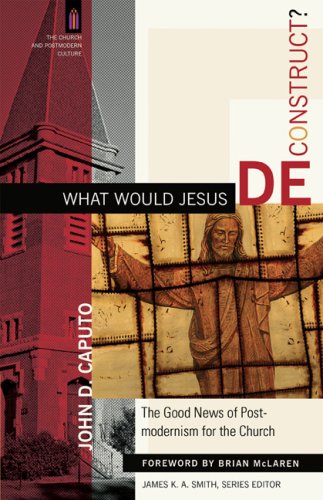Expecting the Unexpected (What Would Jesus Deconstruct?)

Last week I did a lecture in class on John Caputo’s most recent book,What Would Jesus Deconstruct? I have mixed feelings about the book (more on this later) but I think in either case he makes some very helpful comments. The class I am currently a TA for is Mission in Contemporary Culture. In it we basically look at the world of cultural studies and how it (or if) it can be used in the church and in theology. Caputo’s book is a great example of deconstruction (I’ll hesitantly call a method used in culture studies) meeting the church.
Caputo takes as his starting point Charles Sheldon’s classic late nineteenth century text In His Steps (where we get the famed question WWJD?) and looks at the interruption of the homeless man entering the worship service and breaking down as an example of deconstruction. That is, during a worship service, is the is the unexpected and uninvited that transforms, the exact opposite of what was ‘programmed’ or planned for worship.
The man says,
I’m not an ordinary tramp, though I don’t know of any teaching of Jesus that makes one kind of a tramp less worth saving than another. Do you?…It seems to me there’s an awful lot of trouble in the world that somehow wouldn’t exist if all the people who sing such songs went and lived them out. I suppose I don’t understand. But what would Jesus do?
Caputo, What Would Jesus Deconstruct?, 20-21
It is the voice and the physical embodiment of ‘the other,’ who finally breaks through to the congregation, challenges their perspectives, and moves them to true transformation (the rest of the story is about how this congregation is transformed by this event).
This of course gets me thinking about the strength of the unprogrammed Quaker tradition, there is space for ‘the other’ and for the interruption. Yet, before we over romanticize it, even creating a space for interruption can become planned out, calculable and/or ritualized (this is one underlying point to Pink Dandelion’s ‘Liturgies of Quakerism’‘). But even still, the church needs to continue to expect the unexpected, and welcome the unwelcome, and in my opinion this doesn’t look like just doing the same old thing every single sunday (not every risk can be avoided). Yet, the point of Sheldon’s book is that even if we do the ‘same old, same old’ it can be interrupted, even though it can be a rather traumatic experience (the homeless man dies that evening).
But then again, isn’t the entire narrative of Christianity one of expecting the unexpected? If Jesus showed up in our churches on Sunday morning, what would he ‘deconstruct?’ And would he be welcomed?